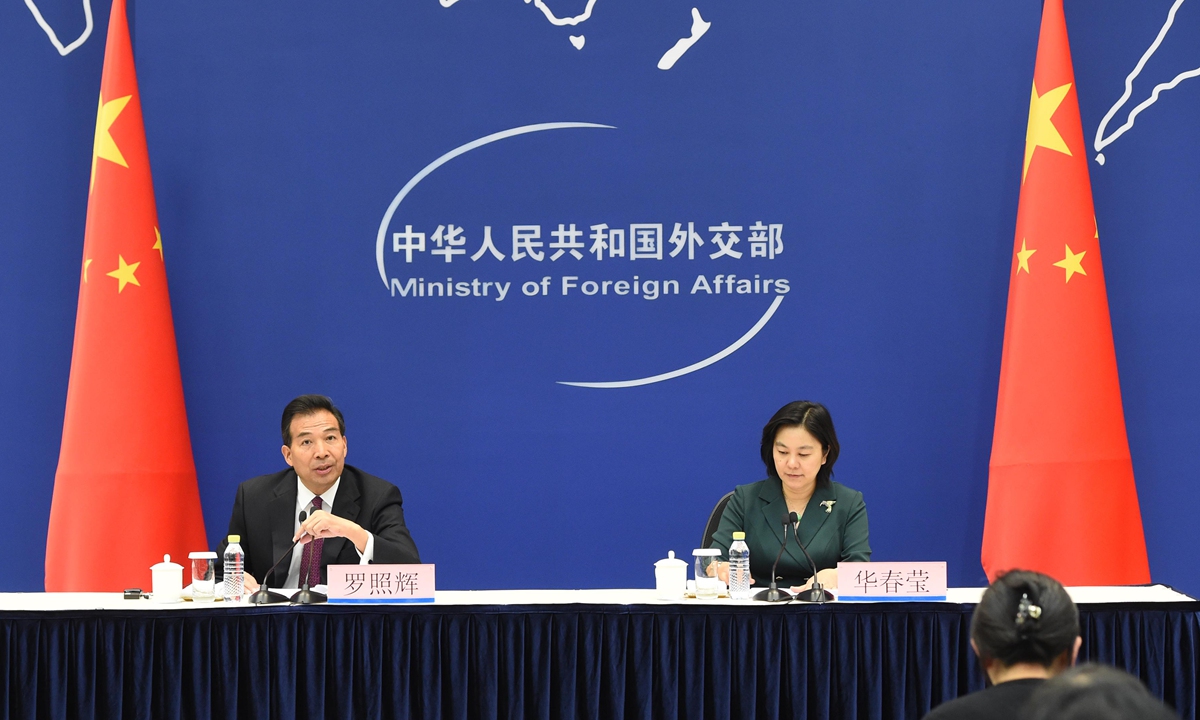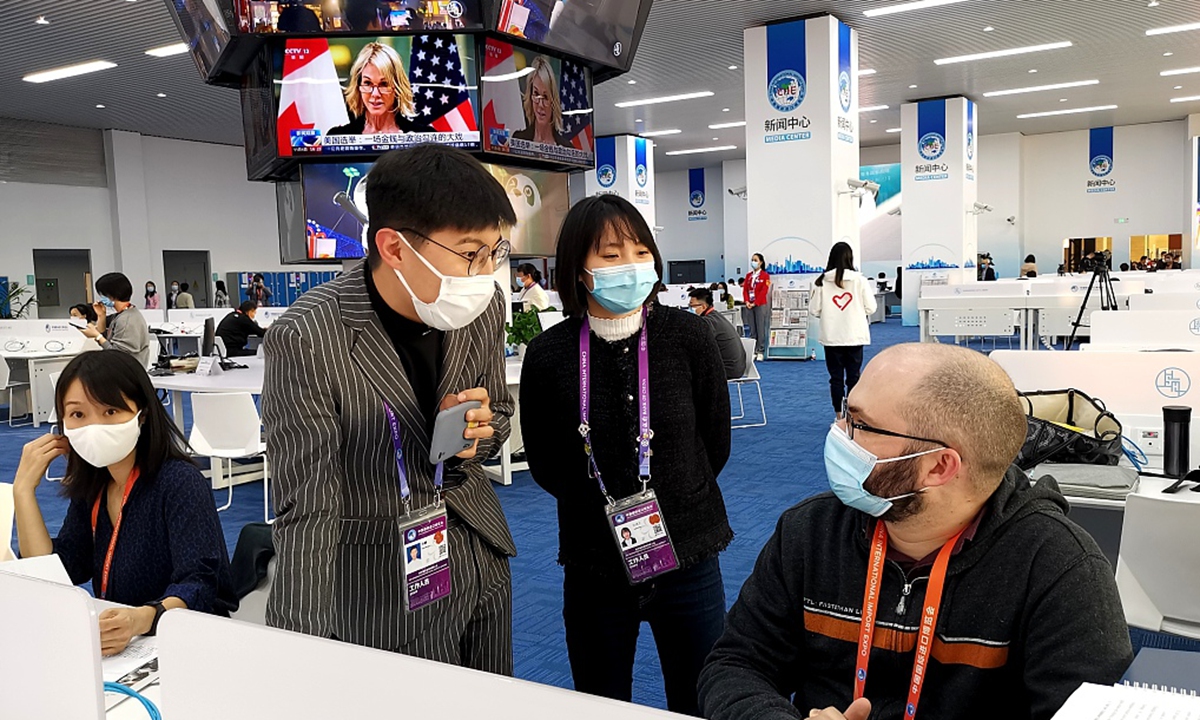
Microphone Photo: VCG
Chinese President Xi Jinping said China needs "to develop a voice in international discourse that matches China's comprehensive national strength and international status," as Chinese top leaders had a group study session on strengthening China's capacity for international communication on Monday, with experts saying China will not keep silent amid a stigmatization and propaganda warfare launched by the US and its allies, and China has the confidence to shape a more "reliable, admirable and respectable image."
Xi, also general secretary of the Communist Party of China (CPC) Central Committee, has stressed improving the country's capacity for engaging in international communication to present a true, multi-dimensional and panoramic view of China.
Xi made the remarks on Monday when addressing the group study session of the Political Bureau of the CPC Central Committee, the Xinhua News Agency reported.
Zhang Weiwei, director of the China Institute of Fudan University in Shanghai, delivered a presentation at the group study session on the topic, and gave advice for relevant work. The leaders of the political bureau listened to the presentation attentively and discussed the matter, Xinhua reported.
The ongoing COVID-19 pandemic has brought a dramatic change in the public opinion fields inside and outside China, as Chinese are more confident in their own political system and governance while Westerners are being increasingly pessimistic and worried, and more hostile against China as they found their political system has many serious flaws and their moral image is collapsing.
Zhang, who also served as an English interpreter for Chinese former leader Deng Xiaoping and is a scholar who travelled more than 100 countries for research, focusing on Chinese studies for a long term, told the Global Times that "When China is successfully controlling the epidemic situation and making huge contributions to reinforcing the global fight against the pandemic, the West's poor performance and selfish decision-making look very embarrassing under the comparison," and the facts have proven that the Western liberalistic narrative can no longer prevail in the East or West, and more and more people have realized the trend.
Chinese and Western narrative powers are now experiencing "a period of transition," Zhang said.
Why China's voice still weak?At the group study session, Xi stressed the need to have a profound understanding of how important and necessary it is to improve the country's international communication, and to develop a voice in international discourse that matches China's comprehensive national strength and international status.
Although China's influence on international discourse has improved since the 18th CPC National Congress in 2012, the country faces new situations and tasks, he said.
Xi stressed greater efforts to construct China's own discourse and narrative, interpreting China's practices by its own theories.
Xi's remarks show that China is making a top-level design on building its own narrative and would encourage more people from society to take part in the communication with the outside world, said Steven Dong, professor and dean of the School of Government and Public Affairs under the Communication University of China, noting that new institutions or mechanism may occur to promote the work.
Analysts said that due to the cultural tradition of humility of the Chinese nation, China is not a country that loves promoting itself to other nations, and it doesn't like playing tit-for-tat with others and prefers to treat others with kindness. This is a key reason why China's voice in the Western-dominated global public opinion field is yet to match its national strength and influence.
"Our nation believes that as long as the works have been done nicely, the words would be unnecessary, and then the sincere compliments from others will emerge automatically," said Zheng Ruolin, a senior Chinese media professional and European studies expert based in France.
China is not interested in becoming a hegemony, so it has no clear plan to form a media hegemony to compete with the West, and it used to believe as long as China keeps a low profile and being peaceful, and has win-win cooperation with the West, then the West will be friendly to China, but the facts prove that this kind of thinking was naive, Zheng said.
The rising hostility held by the US against China in recent years proves that the US and its allies don't care about China's intention but only care about China's capability, said Chinese experts.
A Beijing-based expert on international relations who requested anonymity said that "it's easy for China to fix China-US ties immediately. As long as China announces it gives up 5G technology, space exploration, all advanced weapons and economic development, all struggles between China and the US would disappear. To stay weak and obey, and accept Western narrative hegemony in the international field of public opinion is the key for a non-Western country to keep the ties with the US friendly. It's never about democracy and freedom; it's about strength and autonomy."

China's Ministry of Foreign Affairs holds a press briefing on October 9, 2019. Photo: VCG
Western hegemony in discourse When the US and its allies have realized that they cannot bully China into submission through a trade war and military pressure, and failed in the competition with China in the performance of handling the COVID-19 pandemic, they have selected the battleground of public opinion, where they still have clear advantages due to the long-existing media hegemony owned by the West, said Chinese experts.
Although Chinese people, media and diplomats always pay efforts to introduce the truth and refute the lies, their voices are hardly heard since the West is controlling almost all major international media platforms, and this is how the media hegemony works when the West wants to crack down on its competitors, said Zheng.
The West is using its hegemonic advantage in the battleground of public opinion to launch stigmatization against China and forge a negative narrative of China. This has damaged the external public opinion environment for China's development. So in order to realize the national rejuvenation, China must solve this problem, experts said.
Xi said multilateralism must be promoted while unilateralism and hegemony should be opposed to guide the international community to jointly shape a more just and equitable international order and forge a new type of international relations.
The friendly voices toward China are now unwelcome among Western social media and traditional media as the anti-China sentiment is becoming a "political correctness" of the West, said Zheng, but fortunately, Western countries, in terms of population, cannot represent the majority of the world.
"Among the third world countries, China's image is much more positive, and many countries' political elites and people in regions like Africa, Southeast Asia and Middle East are defending or supporting China's stance and image in the international arena. This is an optimistic trend for China," Zheng said.
It's impossible for China to convince every single country and make all Western countries friendly, but it's possible for China to win the support from the majority of the international community, so it's not necessary to merely focus on Western mainstream media's opinion, but to pay more attention to the public opinion in the third world, said some Chinese analysts.

Chinese and foreign journalists work at the Media Center of the third China International Import Expo (CIIE) in Shanghai on November 4, 2020. File Photo: VCG
China's image in futureXi called for using new concepts, domains and expressions to better tell China's stories and the spiritual strength behind the stories.
On CPC's publicity, Xi urged greater efforts to help foreign audiences understand what the Party is pursuing is nothing but the Chinese people's well-being.
Xi also emphasized the efforts to introduce the Chinese culture abroad and strive to shape a reliable, admirable and respectable image of China.
However, China's rising confidence and firm stance to defend its interests in international occasions have been described by some Western media as "wolf warrior diplomacy," since they felt that China is being more and more aggressive and assertive toward the West.
"We need to make the West get used to this" since China's diplomacy is becoming more confident and firmer, and "We need to set rules for Americans" to let them learn what will happen if they are not respectful, Zhang said, noting that to talk to the arrogant and ignorant people, "we have to be straight, otherwise they don't understand."
Jin Canrong, associate dean of the School of International Studies at the Renmin University of China, said "some people are afraid of offending the West. They don't dare to criticize the West even when the West is making mistakes. Why can't the US be criticized?"
China, as the only and the biggest developing country in the permanent members of the UN Security Council, is not just speaking for itself but also for the 80 percent population in the world who are from the developing countries, "so if China keeps silent when the West makes mistakes, who else could speak out?" Jin noted.
Aside from firm rebuttals of rumors and smears against China, narratives of China for international communication would be diverse and flexible, Dong said, adding that the future international image of China would be respectable and gentle, neither cringing nor arrogant.






